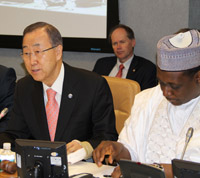News
Secretary-General Says Commodities Can Save Lives
- 22 May 2012
News
UNITED NATIONS, New York -- While commending the work of a United Nations commission trying to improve access to life-saving medicines, Secretary-General Ban Ki-moon today said that much remains to be done to save the lives of the 800 women and more than 20,000 children who die every day from preventable causes.
“Every two minutes, a woman dies at what should have been a joyful moment [childbirth]. And millions of women are unable to choose if, when and how many children they would like to have because they lack access to modern contraception – this tells me we are still not doing enough,” said Mr. Ban in remarks at the opening of the UN Commission on Life-Saving Commodities for Women and Children.
“As your work clearly shows, we do not need to wait for scientific breakthroughs,” said Mr. Ban. “We already have commodities, knowledge, interventions and policies that can prevent needless deaths.

“This is our opportunity to ensure they reach the women and children who need them, now. This is our opportunity to make a lasting contribution to economic growth and sustainable development,” he added.
It is important to continue reaching out to achieve full commitment at country level, according to Dr. Babatunde Osotimehin, Executive Director of UNFPA and Vice-Chair of the Commission.
“It is crucial to take these commodities the last mile, beyond the district level. We need to scale up efforts and mobilize local communities to help expand access,” Dr. Osotimehin said, explaining that the availability of priority medicines and contraceptives in developing countries is compromised by poor supply and distribution systems, insufficient health facilities and staff, low investment in health and high cost of supplies.
Surveys conducted in 14 African countries show that critical life-saving priority medicines for mothers and children are available in only 35 to 50 per cent of public and private facilities and drug stores.
"In the poorest countries, where most of maternal deaths occur, approximately one in four women has access to high quality medicines at the time of birth," said Jens Stoltenberg, the Norwegian Prime Minister who co-chairs the Commission, adding, "Clearly we can do better than this. Medicines that stop dangerous bleeding and infection are not expensive. They cost only a few cents, not dollars.
"The day of birth is the most dangerous day in the life of a woman and her child," he continued. "The fact that women do not get the care they need during childbirth is the most brutal expression of discrimination against women."
For Dr. Muhammad Ali Pate, Minister of State for Health of Nigeria, also present at the meeting, the full and effective participation of countries from the South is imperative to ensure inclusiveness and transparency. “Concerted efforts should be made to assist countries of the South to increase productivity and self-sufficiency in life-saving commodities for women and children,” Dr. Ali Pate said, adding that developing countries need assistance to enhance their industrial capacity, as well as reduced tariffs in order to increase access to most needed supplies.
Dr. Osotimehin noted that the preparations for the Family Planning Summit this summer in London and the Commission’s work will complement each other. “There is a great opportunity to integrate efforts, create synergy and ensure strong, coordinated results,” he added.
UNFPA and UNICEF launched the Commission in March, with the aim of improving access to essential but overlooked health supplies that could save the lives of millions of women and children every year. It activities include identifying strategies for improving the delivery of essential health supplies, promoting new technologies and products, and strengthening regulatory frameworks.